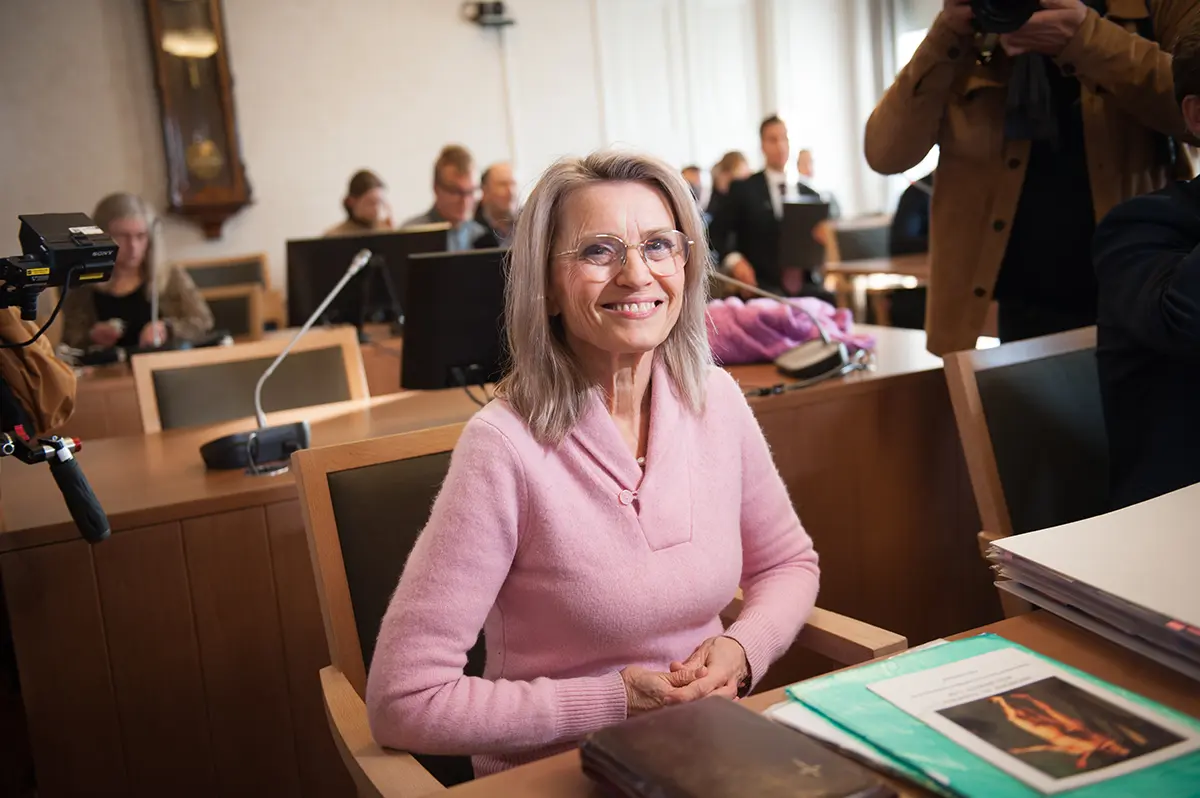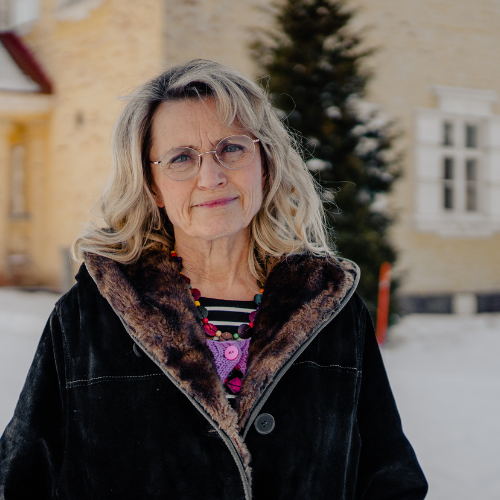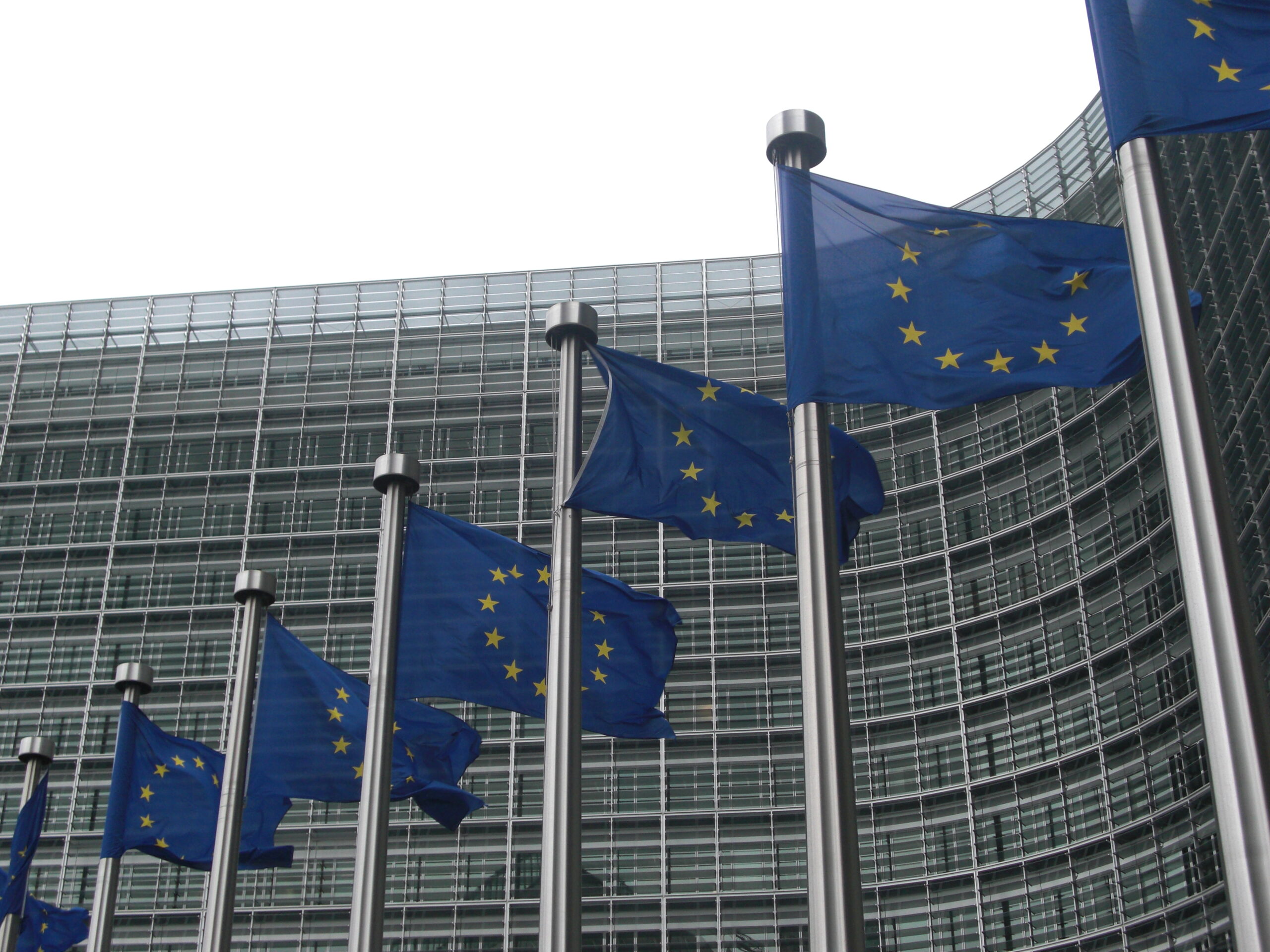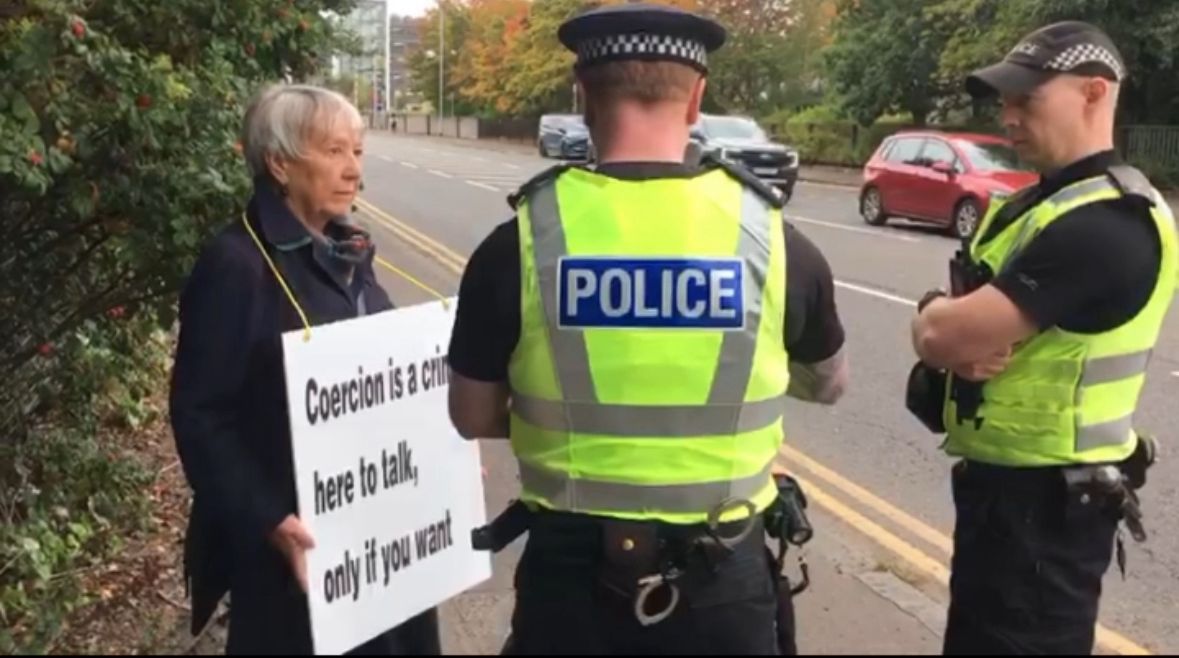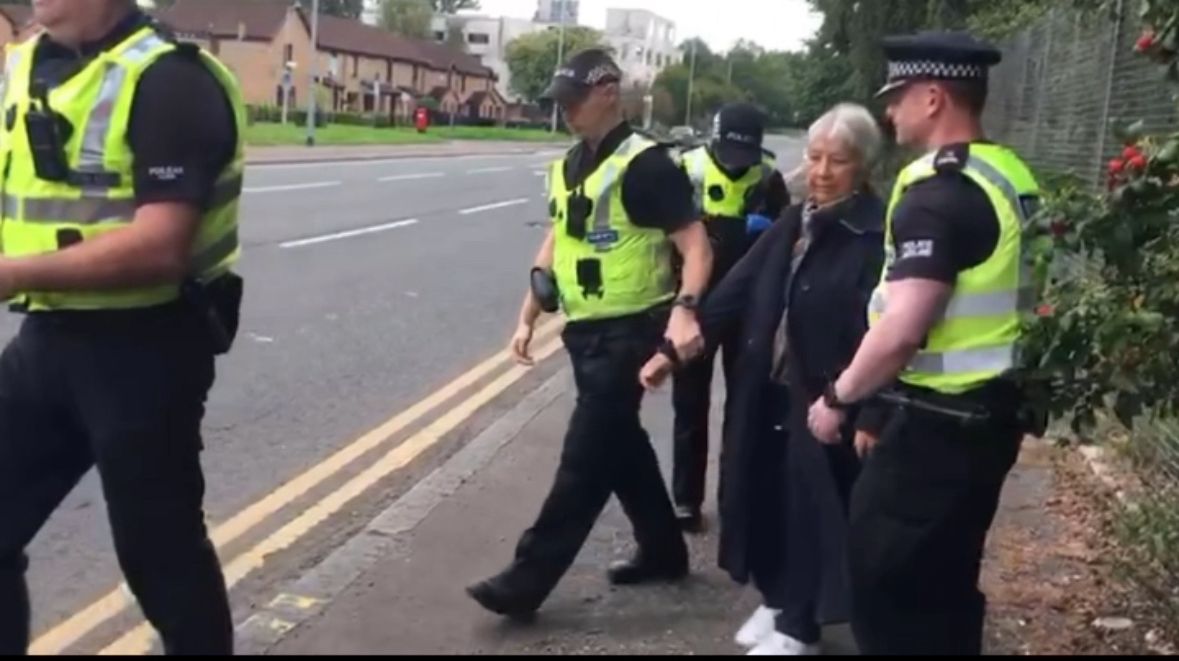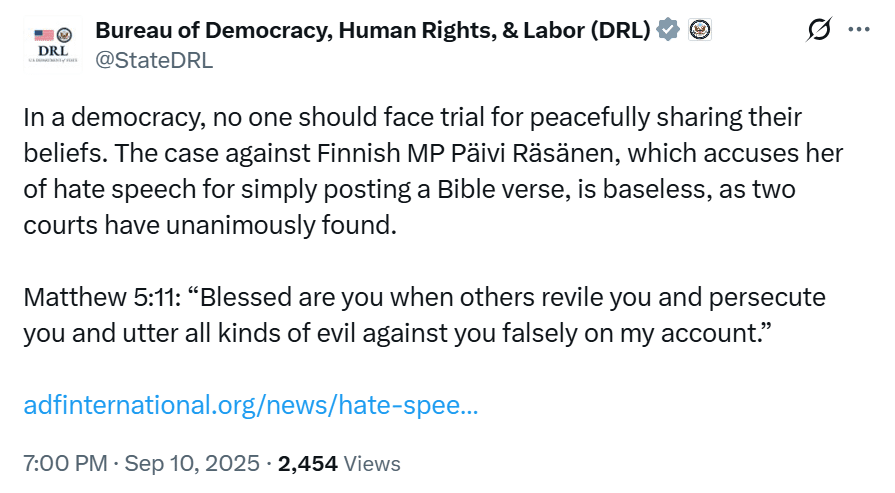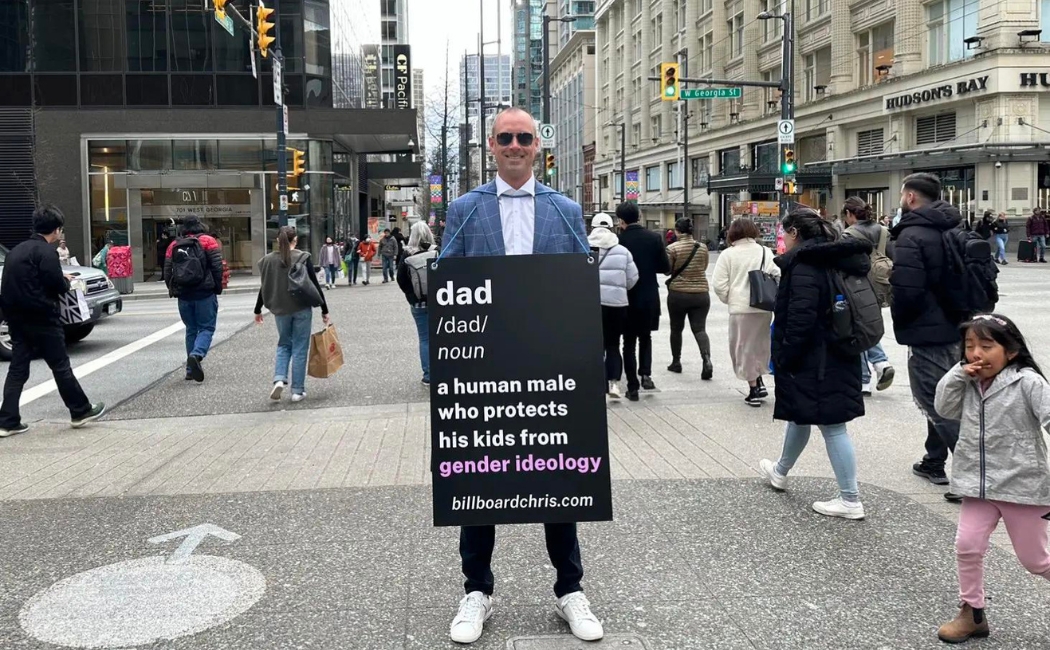Prosecution seeks conviction for quoting the Bible as Finland’s highest court hears final appeal
Continue readingTOMORROW: Finnish Politician Faces Supreme Court for Bible Tweet
Tomorrow, the Supreme Court of Finland will hear the landmark case of Finnish parliamentarian Dr. Päivi Räsänen and Bishop Juhana Pohjola, who stand accused of “hate speech” for publicly expressing their Christian beliefs.
Continue readingOne hundred experts write to European Commission warning EU legislation risks censoring global speech
- Letter calls on Commission to consult free speech experts as part of review into censorial Digital Services Act (DSA)
- Letter from free speech experts, which was coordinated by ADF International, comes after US Ambassador to EU and Google recently expressed concerns that DSA risks censoring American online speech
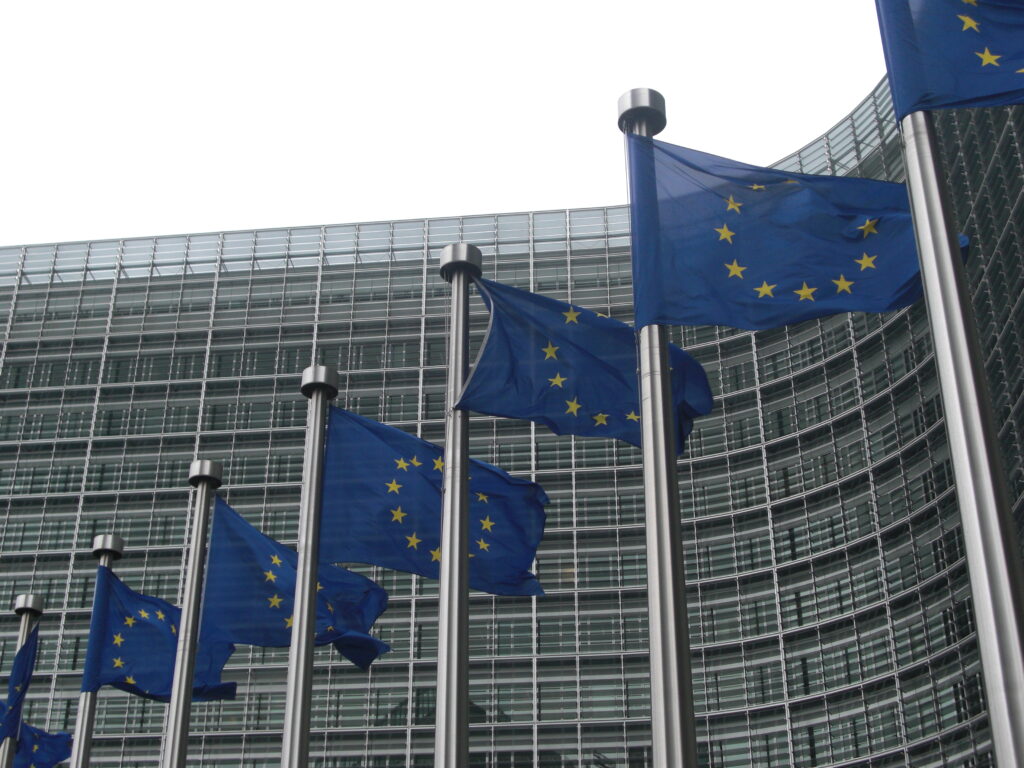
BRUSSELS (9 October 2025) – More than 100 free speech experts from around the world today wrote to the European Commission warning that an EU law risks censoring global speech online.
In a letter to the European Commission, the 113 experts, including a former VP of Yahoo Europe, a former US Senator, and politicians, academics, lawyers and journalists from around the globe, called on the Commission to consult free speech experts as part of its review into the EU’s Digital Services Act (DSA), which will take place by 17 November.
The letter, which was coordinated by free speech legal advocacy organisation ADF International, states: “[The DSA] constructs a pan-European censorship infrastructure with loosely defined boundaries and the potential to suppress legitimate democratic discourse…
“The wide definition of illegal content allows the most speech-restrictive provisions of one single EU country to be imposed as a standard across the entire Union, and potentially worldwide, effectively importing the lowest common denominator of expression.”
The letter added: “The broad definition of ‘illegal content’ in the DSA, combined with existing jurisprudence of the Court of Justice of the European Union (CJEU) opens the door to worldwide takedowns.”
Signatories include ADF International Executive Director Paul Coleman, President, CEO, and Chief Counsel of Alliance Defending Freedom Kristen Waggoner, former Vice President of Yahoo Europe Jean-Marc Potdevin, former US Senator and former US Ambassador-At-Large for International Religious Freedom Sam Brownback, Founder and General Secretary of the Free Speech Union Toby Young, former President of the American Civil Liberties Union Nadine Strossen, award-winning journalist and author Michael Shellenberger and Research Fellow at the Hoover Institution Ayaan Hirsi Ali.
Cross-party Members of the European Parliament (MEPs) also signed the letter, including ECR MEP Stephen Bartulica, EPP MEP Branko Grims, and Patriots MEP Virginie Joron, as well as McCormick Professor of Jurisprudence at Princeton University Robert P George, American philosopher and author Peter Boghossian, child protection advocate Chris Elston aka Billboard Chris and other experts from the UK, Europe, Latin America and the United States.
Read the full letter, see the full list of signatories and sign the public version of the letter here.
Opaque review process into DSA
The letter expresses concern over the European Commission’s opaque review process into the DSA and calls on the Commission to: “Conduct a comprehensive and inclusive consultation with independent experts in freedom of expression, constitutional law, and digital rights, ahead of the November review, inviting public comments.
“Publicly disclose the list of NGOs, civil society actors, and partner entities engaged in the review process, including the criteria and methodology used for their selection.
“Ensure that the review includes a rigorous legal analysis of the DSA’s compatibility with fundamental rights protections, especially under Article 11 of the Charter of Fundamental Rights of the EU, Article 10 of the ECHR, and Article 19 of the ICCPR.”
Concerns from US Ambassador to the EU
The experts’ letter to the European Commission comes after the US Ambassador to the EU Andrew Puzder last week expressed concern that the DSA risks censoring American citizens, and follows Google warning the DSA threatens American speech.
Ambassador Puzder last week said: “No President of either party, and I can tell you President Trump in particular, is going to tolerate a foreign government restricting the First Amendment fundamental free speech, free expression rights of American citizens, to an extent that the United States government can’t even regulate those rights.
“So we need to come to an understanding as to what’s happening with the Digital Services Act.”
Ambassador Puzder has also reportedly said the United States will make formal submissions under the European Commission’s review of its digital legislation.
The letter’s warning about the threat of global DSA censorship reinforces Ambassador Puzder’s and Google’s concerns.
Dr Adina Portaru, Brussels-based Senior Counsel, Europe for ADF International said:
“The European Commission claims the DSA will not censor speech and will merely create a safer online environment. In this letter, one hundred free speech experts vehemently disagree.
“The US Ambassador to the EU and Google recently expressed concern that the DSA threatens American online speech. This letter from experts reinforces these concerns and warns that the legislation threatens to impose an online censorship regime not just in the EU, but across the whole world.
“The Commission must urgently engage with these concerns in their review of the DSA, and act to ensure freedom of expression is protected online.”
French MEP and signatory of the letter Virginie Joron said:
“The French digital regulator ARCOM told me they believe the DSA allows them to censor any post anywhere in the world using the DSA. That means even an American citizen posting in Alabama could potentially have their online post taken down, even if the publication would be legal in the US.
“This already happened in 2023 after the Annecy terror attack in a playground in the South of France where a migrant from Syria stabbed four babies and toddlers. A reaction from a US citizen was taken down, as described in the report from the US Congress.”
As well as warning about the possibility of global takedown orders under the DSA, the letter also quotes the US House Judiciary Committee in highlighting another way the EU legislation risks censoring global online speech: “Because many social media platforms generally maintain one set of content moderation policies that they apply globally, restrictive censorship laws like the DSA may set de facto global censorship standards.”
Read more about the DSA here.
Images for free use in print or online in relation to this story only
(From left to right: Dr Adina Portaru, Brussels-based Senior Counsel, Europe for ADF International; French MEP Virginie Joron)
U.S. State Department: Arrest of Scottish Christian Grandmother is “Tyrannical”
- Christian grandmother arrested a second time; criminally charged for holding a sign reading “Coercion is a crime, here to talk, only if you want” within 200m of a hospital
- “The arrest of Rose Docherty is another egregious example of the tyrannical suppression of free speech happening across Europe”, warns U.S. State Department
GLASGOW (29 September 2025) – The U.S. State Department has expressed concern over the arrest of 75-year-old Rose Docherty, as seen in a viral video over the weekend.
The Glasgwegian grandmother has been criminally charged for holding a sign within 200m of the Queen Elizabeth University Hospital, reading:
“Coercion is a crime, here to talk, only if you want.”
In Scotland, “buffer zones” are enforced within 200m of every hospital, forbidding harassment, intimidation, and “influencing” of anyone seeking to access abortion services.
"The United States will always speak out against these violations of fundamental rights."
- U.S. State Department Spokesperson
Responding to the arrest, the U.S. State Department told the Telegraph:
“The arrest of Rose Docherty is another egregious example of the tyrannical suppression of free speech happening across Europe.
“When 75-year-old grandmothers are being arrested for standing peacefully and offering conversation, common sense and basic civility are under attack.
“The United States will always speak out against these violations of fundamental rights.”
Despite only having offered consensual conversation and not having approached any individual, nor making any statement on abortion – Docherty has been charged with breaching the “buffer zone.”
Reacting to her arrest, Rose Docherty said:
“Everybody has the right to engage in consensual conversation. I held my sign with love and compassion, inviting anyone who wants to chat, to do so – and stood peacefully, not approaching anyone.
“I should not be treated as a criminal for inviting people to chat with me – lending a listening ear. Conversation is not forbidden on the streets of Glasgow. And yet, this is the second time I have been arrested for doing just that.”
In August, Scottish authorities dropped their case against Docherty for holding the same sign in the same place after a global outcry against the 75-year-old grandmother’s arrest, including concerns raised in an online post by the U.S. State Department.
After her arrest this week, Docherty was held in custody for several hours. She was refused a chair to sit on in her cell, despite making it known that she had a double hip replacement.
Docherty has been charged and released on bail. Stringent bail conditions prevent her from attending an area marked out to be wider than the initial “buffer zone” area, in a move the legal team at ADF International call “disproportionate”.
Legal Counsel for ADF International, Lorcan Price commented:
“It’s deeply concerning that Scottish policing resources are being ploughed into arresting and prosecuting a peaceful grandmother offering to speak to people in public, rather than focusing on the problems caused by real crime in Glasgow.
“This is not a case about harassment, intimidation or violent protest – this is simply a grandmother, who held a sign offering to speak to anyone who would like to engage.”
The law’s architect, Gillian Mackay MSP, admitted on BBC Scotland earlier this year that the vague prohibitions in the buffer zones law could criminalise someone for praying visibly from a window in their home within the zone, “depending on who’s passing by the window.”
U.S. Vice President J.D. Vance highlighted this law as a particular matter for concern in his Munich Security Conference speech in February of this year.
Images for free use in print or online in relation to this story only
Pictured: Rose Docherty, Lorcan Price (ADF International)
Glasgow Grandmother arrested AGAIN for offering conversations in abortion “buffer zone”
- Christian grandmother arrested a second time; criminally charged for holding a sign reading “Coercion is a crime, here to talk, only if you want” within 200m of a hospital
- Rose Docherty, aged 75, left without chair for two hours in a police cell – despite having two hip replacements
GLASGOW (27 September 2025) – 75-year-old grandmother Rose Docherty has been arrested a second time and criminally charged for holding a sign within 200m of the Queen Elizabeth University Hospital, reading:
“Coercion is a crime, here to talk, only if you want.”
In Scotland, “buffer zones” are enforced within 200m of every hospital, forbidding harassment, intimidation, and “influencing” of anyone seeking to access abortion services.
“I should not be treated as a criminal for inviting people to chat with me – lending a listening ear."
- Rose Docherty
Despite only having stood silently offering consensual conversation and not having approached any individual, Docherty has been charged with breaching the “buffer zone.”
Reacting to her arrest, Rose Docherty said:
“Everybody has the right to engage in consensual conversation. I held my sign with love and compassion, inviting anyone who wants to chat, to do so – and stood peacefully, not approaching anyone.
“I should not be treated as a criminal for inviting people to chat with me – lending a listening ear. Conversation is not forbidden on the streets of Glasgow. And yet, this is the second time I have been arrested for doing just that.”
In August, Scottish authorities dropped their case against Docherty for holding the same sign in the same place after a global outcry against the 75-year-old grandmother’s arrest, including concerns raised in an online post by the U.S. State Department.
After her arrest this week, Docherty was held in custody for several hours. She was refused a chair to sit on in her cell, despite making it known that she had a double hip replacement.
Docherty has been charged and released on bail. Stringent bail conditions prevent her from attending an area marked out to be wider than the initial “buffer zone” area, in a move the legal team at ADF International call “disproportionate”.
Legal Counsel for ADF International, Lorcan Price commented:
“It’s deeply concerning that Scottish policing resources are being ploughed into arresting and prosecuting a peaceful grandmother offering to speak to people in public, rather than focusing on the problems caused by real crime in Glasgow.
“This is not a case about harassment, intimidation or violent protest – this is simply a grandmother, who held a sign offering to speak to anyone who would like to engage.”
The law’s architect, Gillian Mackay MSP, admitted on BBC Scotland earlier this year that the vague prohibitions in the buffer zones law could criminalise someone for praying visibly from a window in their home within the zone, “depending on who’s passing by the window.”
U.S. Vice President J.D. Vance highlighted this law as a particular matter for concern in his Munich Security Conference speech in February of this year.
Images for free use in print or online in relation to this story only
Pictured: Rose Docherty, Lorcan Price (ADF International)
US State Department Speaks Out in Support of Parliamentarian Prosecuted for Bible-Verse Post: “In a Democracy, No One Should Face Trial for Peacefully Sharing Their Beliefs”
A US State Department bureau said on Wednesday that the criminal prosecution of Finnish MP Päivi Räsänen “is baseless” and tweeted a Bible verse in support.
Continue reading‘Hate Speech’ Case Over Bible Tweet Dragged Into 7th Year as Finnish Supreme Court Sets Hearing Date for 30th October
- Päivi Räsänen, former Finnish Minister of the Interior, faces third court hearing after two previous unanimous acquittals
- Räsänen faces criminal charges for sharing her faith-based beliefs on marriage and sexuality, including on X in 2019
- ADF International continues to coordinate Räsänen’s defence to protect everyone’s right to free speech

HELSINKI (25 August 2025) – The Finnish Supreme Court has set the date for an oral hearing in the free speech case involving Finnish Member of Parliament Päivi Räsänen and Lutheran Bishop Juhana Pohjola. Both were previously unanimously acquitted of “hate speech” charges by two lower courts after publicly expressing their Christian beliefs. With the hearing scheduled for 30th October 2025, the state prosecutor’s censorship campaign against Räsänen and Pohjola will enter its seventh year.
“It is shocking that after two unanimous acquittals, Päivi Räsänen is again being dragged to court to defend her fundamental right to freedom of speech. As we have warned for years, vaguely worded ‘hate speech’ laws allow ideological prosecutions like this to take place. We stand behind Päivi and we will continue to work toward the bigger victory when such ludicrous cases are no longer brought. In a free and democratic society, all should be allowed to share their beliefs without fear of punishment.
- Paul Coleman, Executive Director of ADF International and part of Räsänen’s legal defence team
Charged for sharing Christan beliefs
Räsänen, who is a medical doctor, Finland’s former Interior Minister, and a parliamentarian since 1995, was formally charged with “agitation against a minority group” in 2021. She was charged under a section of the Finnish criminal code titled “war crimes and crimes against humanity” for sharing her Christian beliefs on marriage and sexual ethics in a 2019 tweet, as well as a 2019 live radio debate and 2004 church pamphlet. Bishop Pohjola was charged for publishing Räsänen’s 2004 pamphlet.
The high-profile lower court trials received significant global attention, particularly after the prosecution attacked core Christian teachings and cross-examined Räsänen and the Bishop on their theology in the court hearings.
“It isn’t a crime to tweet a Bible verse, or to engage in public discourse from a Christian perspective. The attempts to criminalize me for expressing my beliefs have resulted in an immensely trying last few years, but I still hope for a positive result that will stand as a key precedent to protect the human right to free speech in Finland,” said Räsänen, grandmother of twelve.
Censorship campaign persists despite court acquittals
Two lower instance courts had previously acquitted Räsänen and Pohjola in April 2022 and November 2023 of all three charges. The prosecutor appealed for a third time, taking the charges concerning the booklet and the tweet to the Supreme Court, which will hear oral arguments on 30th October 2025.
Coordinated by ADF International, Räsänen’s legal defence will continue to highlight the strong protection that freedom of speech enjoys in international law, in addition to being integral to Finnish democracy.
The defence previously submitted to the court that Räsänen’s use of the word “sin” in her tweet, which the prosecution had highlighted as “insulting” and therefore unlawful, was quoted directly from the Bible, and any judgment condemning its usage would directly condemn the Bible itself.
The Bible on Trial
During the high-profile trial before the Court of Appeal in 2023, the prosecution frequently attacked core Christian teachings and cross-examined Räsänen – who is one of Finland’s longest-standing members of parliament – and the Bishop on their theology.
The Finnish State prosecutor, Anu Mantila, claimed that, “You can cite the Bible, but it is Räsänen’s interpretation and opinion about the Bible verses that are criminal”.
To learn more details about the case and to support Päivi Räsänen, visit www.ADFinternational.org/FreeSpeechOnTrial
Images for free use in print or online in relation to this story only with credit to ADF International.
(from left to right: Päivi Räsänen, Räsänen with Paul Coleman, Räsänen with her husband Niilo)
U.S. State Department Doubles Down on Warning to UK: “Buffer Zones” are an “Egregious Violation” of Free Speech
- State Department issues a further condemnation of Britain’s “egregious” buffer zones, warning of a “concerning departure” from shared UK-US values
- Birmingham Christian Isabel Vaughan-Spruce is back under investigation for silently praying near an abortion facility

WASHINGTON, D.C. / LONDON (19 August 2025) – The United States has issued its strongest warning yet to the UK over so-called “buffer zones”, which have been used to target silent prayer and peaceful expression outside abortion facilities.
In a comment to the Telegraph, the US State Department accused the UK government of committing an “egregious violation of the fundamental right to free speech and religious liberty.”
“It is common sense that standing silently and offering consensual conversation does not constitute harm.”
- U.S. State Department Spokesperson
The comment comes in response to cases in which individuals – some elderly – have been arrested, charged, or even criminally convicted for simply for praying silently or offering consensual conversations within large censored zones outside abortion facilities.
Under current legislation in England & Wales, “influencing” a person’s decision to access an abortion facility, within 150m of the facility, is a crime carrying a potentially unlimited fine.
In Scotland, similar legislation exists, censoring the area within 200m of all hospitals.
A State Department spokesman told The Telegraph:
“The United States is still monitoring many ‘buffer zone’ cases in the UK, as well as other acts of censorship throughout Europe.
“The UK’s persecution of silent prayer represents not only an egregious violation of the fundamental right to free speech and religious liberty, but also a concerning departure from the shared values that ought to underpin US-UK relations.
“It is common sense that standing silently and offering consensual conversation does not constitute harm.”
Free Speech in Retreat
The US government’s statement echoes Vice President JD Vance’s warning earlier this year at the Munich Security Conference, where he said free speech is “in retreat” across Europe, particularly in Britain. During Prime Minister Sir Keir Starmer’s visit to the White House, the Vice President directly raised concerns about the UK’s restriction of free speech.
You are currently viewing a placeholder content from YouTube. To access the actual content, click the button below. Please note that doing so will share data with third-party providers.
More InformationThe US State Department’s latest Human Rights Report also highlighted “credible reports of serious restrictions on freedom of expression” in the UK.
Individuals Targeted for Prayer or Conversation
Among those punished under the laws is Livia Tossici-Bolt, a retired biomedical scientist, who received a two-year conditional discharge and was ordered to pay £20,000 in costs after standing near a Bournemouth abortion facility holding a sign that read: “Here to talk if you want to.” She described her prosecution as “a dark day for Great Britain.”
Adam Smith-Connor, an army veteran, was convicted in November for praying silently for a few minutes in his head near the same abortion facility in Bournemouth, and ordered to pay £9,000 in costs.
In Scotland, Rose Docherty, 75, was arrested in February for standing outside Glasgow’s Queen Elizabeth University Hospital with a sign reading: “Coercion is a crime, here to talk, only if you want.” Last week, Scottish authorities dropped their case against her and guaranteed they would return her sign.
And recently, Isabel Vaughan-Spruce – a charitable volunteer who has supported mothers in crisis for over 20 years – was placed back under investigation for praying silently near an abortion facility in Birmingham, despite having won £13,000 in compensation from West Midlands Police last year for having unfairly arrested her twice before for the same activity.
“Freedom of speech and freedom of religion are cornerstones of any free society,” said Lorcan Price, Irish Barrister and Legal Counsel for ADF International.
“The UK’s treatment of individuals like Livia, Adam, Isabel and Rose for the false ‘crimes’ of praying silently or offering conversation shows just how far the country has strayed from its own proud traditions of liberty. The US State Department is right to call out this injustice. It is time for the UK government to restore fundamental freedoms, and repeal buffer zone legislation.”
Images for free use in print or online in relation to this story only
Pictured: Isabel Vaughan-Spruce; Rose Docherty; Adam Smith-Connor; Livia Tossici-Bolt; Lorcan Price (ADF International)
Musk sets sights on EU online censorship law after Australian free speech win
- X owner endorses repeal of EU’s Digital Services Act (DSA)
- On Tuesday, X and Canadian campaigner Chris ‘Billboard Chris’ Elston were successful in striking down an Australian government order from the country’s eSafety Commissioner, that censored Elston’s X post. The legal challenge was coordinated by ADF International and the Human Rights Law Alliance
- Recent investigative report by the US House Judiciary Committee called out international censorship, including from Australia’s eSafety Commissioner and DSA
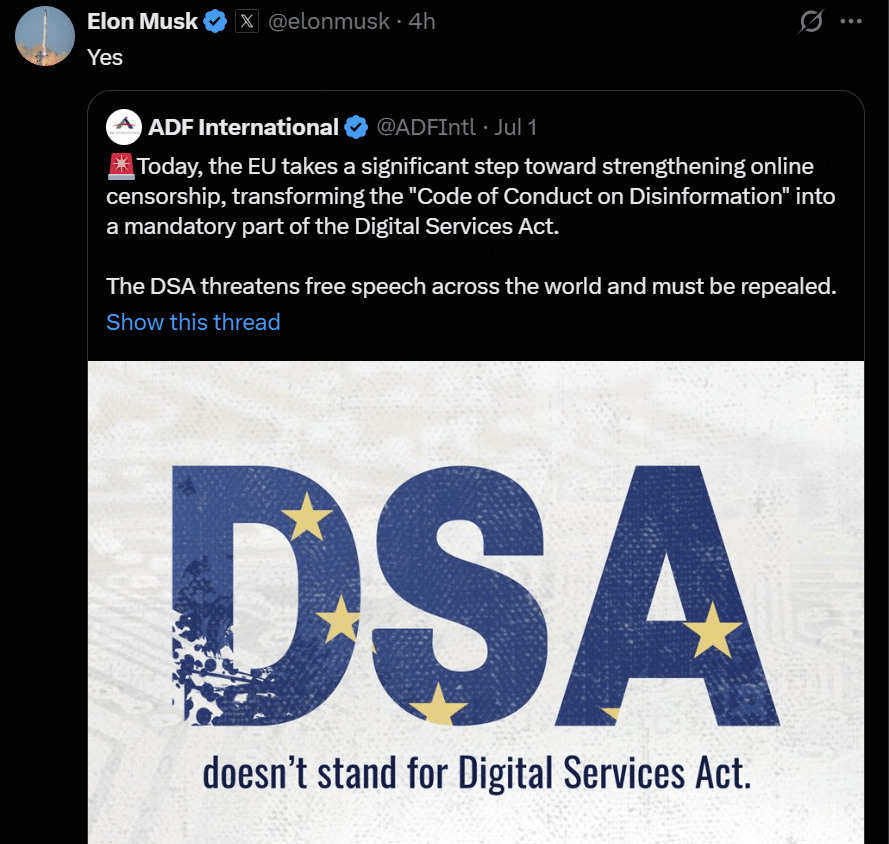
BRUSSELS (3 July 2025) – Elon Musk has set his sights on an EU online censorship law, following his free speech win in Australia earlier this week.
The tech billionaire said “Yes” in response to an X post from ADF International, a Christian legal advocacy organisation that defends free speech, which said: “Today, the EU takes a significant step toward strengthening online censorship, transforming the ‘Code of Conduct on Disinformation’ into a mandatory part of the Digital Services Act.
“The DSA threatens free speech across the world and must be repealed.”
On Tuesday, an Australian tribunal upheld a challenge from X and Canadian campaigner Chris ‘Billboard Chris’ Elston, striking down a government order that censored Elston’s X post. The legal challenge was coordinated by ADF International and the Human Rights Law Alliance of Australia.
Elston’s February 2024 X post referred to controversial WHO “expert” appointee Teddy Cook by her biologically accurate pronouns. The post was deemed “cyber abuse” by Australia’s eSafety Commissioner, which ordered X to remove the content, under the country’s Online Safety Act.
Following a week-long hearing commencing March 31, 2025, the Administrative Review Tribunal in Melbourne ruled this week that the eSafety Commissioner made the wrong decision in determining Elston’s post was “cyber abuse” and set aside the decision. Read more about the win here.
Paul Coleman, an international lawyer specialising in free speech and ADF International’s Executive Director, said: “From the EU’s Digital Services Act to Australia’s Online Safety Act, laws restricting free speech online follow a similar censorial playbook across the world.
“Through legislation like these, we are today witnessing a coordinated global attack on free speech. Elon Musk is right to stand up to DSA censorship and use his platform to advocate for free speech online.
“Following our free speech win in Australia, ADF International we will continue to challenge online censorship in the digital marketplace of ideas.”
Code of Conduct on Disinformation
ADF International’s thread on X, which Musk re-posted with his comment, said: “Today [1 July], the EU takes a significant step toward strengthening online censorship, transforming the ‘Code of Conduct on Disinformation’ into a mandatory part of the Digital Services Act. The DSA threatens free speech across the world and must be repealed.
“The EU’s DSA has created one of the most dangerous censorship regimes of the digital age. It is an authoritarian framework that enables unelected bureaucrats to control online speech at scale—both in Europe and globally—under the guise of ‘safety’ and ‘protecting democracy’.
“The DSA is a legally binding regulatory framework that gives the European Commission authority to enforce ‘content moderation’ on very large online platforms and search engines with over 45 million users per month. Platforms that fail to comply face massive financial penalties and even suspension.
“It requires platforms to remove ‘illegal content,’ defined as anything not in compliance with EU or Member State law at any time, now or in the future. This creates the ‘lowest common denominator’ for censorship across the EU, effectively exporting the most restrictive laws to all Member States. The DSA’s approach to loose concepts such as ‘misinformation,’ ‘disinformation,’ ‘hate speech,’ and ‘information manipulation’ may lead to wide-sweeping removal of online content.”
US House Judiciary Committee report
An investigative report by the House Judiciary Committee recently exposed Australian eSafety Commissioner Julie Inman-Grant’s coordination with international bodies to censor lawful online speech.
In addition to the eSafety Commissioner, it also called out DSA censorship, saying: “In recent years, foreign governments have adopted legislation and created regulatory regimes in an effort to target and restrict various forms of online speech.
“Foreign regulators have even attempted to use their authority to restrict the content that American citizens can view online while in the United States. In particular, the European Commission (EC) and Australia’s eSafety Commissioner have taken steps to limit the types of content that Americans are able to access on social media platforms.”
The report went on to discuss the DSA and said: “Vague, overly burdensome regulations targeted at so-called ‘systemic risks’ create an environment in which platforms are more likely to remove or demote lawful content to avoid potential fines. The ability of European regulations to exert extraterritorial influence over American companies and consumers in this manner is often referred to as the ‘Brussels Effect.’”
Images for free use in print or online in relation to this story only.
Pictured: Paul Coleman, Chris Elston with ADF International’s Lois McLatchie Miller, Chris Elston
Free Speech Victory in Australia for Billboard Chris as “X” post censorship overturned
Tribunal upholds speech rights of Canadian campaigner Chris “Billboard Chris” Elston, striking down a government order that censored his X post under the country’s Online Safety Act.
Censored X post referred to controversial WHO “expert” appointee Teddy Cook by her biologically accurate pronouns.
Censorship case, coordinated by ADF International and the Human Rights Law Alliance, raised alarm over expanding global censorship powers and cross-border restrictions on speech.
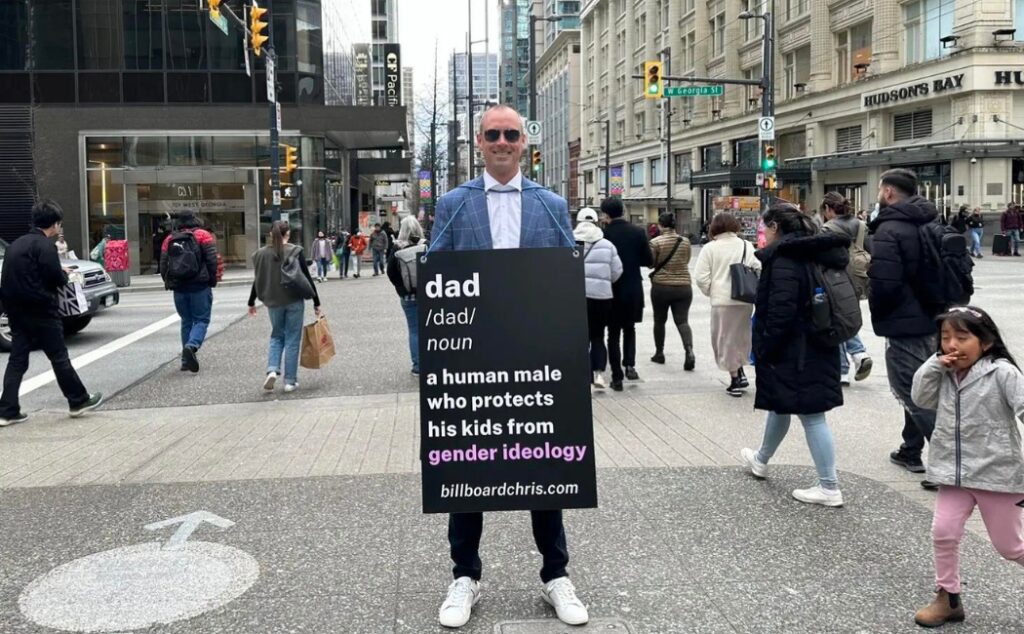
MELBOURNE (1 July 2025) – The Administrative Review Tribunal has ruled in favor of Canadian campaigner Chris “Billboard Chris” Elston, striking down a government order that sought to censor his post on X under the country’s Online Safety Act.
Elston’s February 2024 post criticized the appointment of controversial WHO “expert” appointee Teddy Cook, and referred to her with biologically accurate pronouns. Elston’s post was deemed “cyber abuse” by Australia’s eSafety Commissioner, which ordered X to remove the content. X initially refused, and later geo-blocked the post in Australia.
Both X and Elston challenged the order, arguing that the censorship was a violation of the fundamental right to free speech. Elston’s legal challenge was coordinated by ADF International, in conjunction with the Human Rights Law Alliance in Australia. The Administrative Review Tribunal in Melbourne held a week-long hearing on the case commencing March 31, 2025.
The Tribunal found that the eSafety Commissioner made the wrong decision in determining Elston’s post was “cyber abuse” and set aside the decision.
“This is a decisive win for free speech and sets an important precedent in the growing global debate over online censorship. In this case, the Australian government alarmingly censored the peaceful expression of a Canadian citizen on an American-owned platform, evidence of the expansive reach of censorial forces, even beyond national borders. Today, free speech has prevailed."
- Paul Coleman, Executive Director of ADF International
“This is a victory not just for Billboard Chris, but for every Australian—and indeed every citizen who values the fundamental right to free speech,” Coleman continued.
The decision comes amid growing international concern over the Australian government’s expansive censorship powers. In May, the U.S. State Department condemned the eSafety Commissioner’s actions as part of a broader global trend toward coercive state censorship.
“I’m grateful that truth and common sense have prevailed,” said Chris Elston. “This decision sends a clear message that the government does not have authority to silence peaceful expression. My mission is to speak the truth about gender ideology, protecting children across the world from its dangers. With this ruling, the court has upheld my right to voice my convictions—a right that belongs to every one of us. My post should never have been censored in Australia, but my hope is that authorities will now think twice before resorting to censorship”.
More details on Billboard Chris’ censorship case available here.



